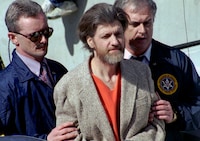Before he was the Unabomber, Ted Kaczynski was a mind-control test subject

Ted Kaczynski, the anarchist and so-called Unabomber who died in a federal prison medical facility on Saturday, transformed from boy genius to terrorist, going from a star mathematics student to a feared assailant who targeted academics, scientists and industrialized society as a whole.
Kaczynski entered Harvard University as a 16-year-old on a scholarship, after skipping the sixth and 11th grades. It was there that he was subjected to an experiment run by Harvard psychologist Henry A. Murray that was backed by the Central Intelligence Agency. Though he graduated with a mathematics degree, later completing a doctorate in the field before becoming a professor, questions remain over whether — or to what extent — he was affected by the experiment, which reportedly involved mock interrogations in which participants’ beliefs were harshly disparaged.
Murray’s study was widely reported to be part of a CIA program code-named Project MK-Ultra, inspired by the use of mind-control techniques on U.S. prisoners of war in Korea by the Soviet Union, China and North Korea. The program sought to understand how to control subjects’ minds, sometimes using substances such as LSD, according to a document the CIA made publicly available in 2018. (There has not been evidence to suggest LSD or similar substances were used at Harvard on Kaczynski.)
“The project attempted to produce a perfect truth drug for use in interrogating suspected Soviet spies during the Cold War,” the document says. “And generally to explore any other possibilities of mind control.”
CIA Director Richard Helms ordered the destruction of many files related to MK-Ultra in 1973. Nevertheless, Kaczynski disclosed some of his apparent involvement in the study in correspondence from prison with the professor Alston Chase, who later wrote a book about the Unabomber.
Chase argued in a June 2000 article in the Atlantic magazine that Kaczynski’s experiences at Harvard — his studies, overlapping with his roughly three-year participation in Murray’s experiment — helped create the Unabomber.
“Thus did Kaczynski’s Harvard experiences shape his anger and legitimize his wrath,” wrote Chase, who died in 2022. “By the time he graduated, all the elements that would ultimately transform him into the Unabomber were in place …”
While working for what was a precursor to the CIA, Murray conducted an experiment that put subjects under mock interrogations, with blinding spotlights and verbal abuse, Chase wrote, citing a report by the psychologist and his colleagues. The Harvard study also involved asking the participants to write essays explaining their worldviews, which were then picked apart by interrogators, according to the History Channel, which cited Murray’s description of the sessions as “vehement, sweeping, and personally abusive.”
Harvard did not immediately respond to a request for comment regarding the study.
Though there has not been a definitive link between the study and Kaczynski’s actions, which killed three people and injured 23 others, some have suggested that the program may have exacerbated his schizophrenia.
“The Harvard experiment was stressful and stress aggravates the symptoms of schizophrenia,” the psychologist Nigel Barber told History. “Otherwise, it would be a mistake to exaggerate the importance of this experience, or to see it as a major determinant of his anti-science and anti-technology political views.”
Others argued against placing too much importance on the influence of the study on Kaczynski. The sociologist Todd Gitlin wrote in a Washington Post review of Chase’s book, “Harvard and the Unabomber: The Education of an American Terrorist,” that the “effect of Murray’s dubious, unethical experiment on Kaczynski is unknown.”
With many of the records regarding the study restricted or destroyed, and with questions about peculiar behavior in Kaczynski’s childhood, it is unclear whether the study can be clearly tied to Kaczynski’s transformation into a domestic terrorist, Gitlin wrote.
In his manifesto — published by The Post in 1995 with the encouragement of federal officials — Kaczynski likened science to a “surrogate activity” that is “directed toward an artificial goal that people set up for themselves merely in order to have some goal to work toward” or some sense of fulfillment.
“Scientists work mainly for the fulfillment they get out of the work itself,” he wrote. “… Thus science marches on blindly, without regard to the real welfare of the human race or to any other standard, obedient only to the psychological needs of the scientists and of the government officials and corporation executives who provide the funds for research.”
This article has been archived for your research. The original version from The Washington Post can be found here.


